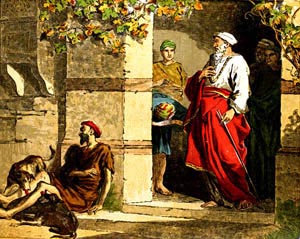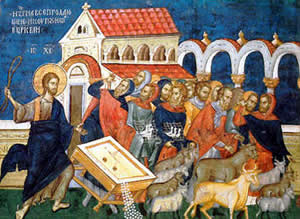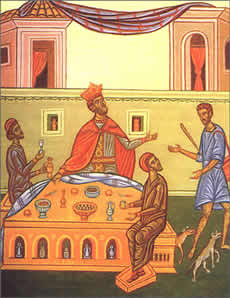Giving Wealth, Getting Faith
For Sunday April 13, 2008
Lectionary Readings (Revised Common Lectionary, Year A)
Acts 2:42–47
Psalm 23
1 Peter 2:19–25
John 10:1–10
 |
The Rich Man and Lazarus, Luke 16. |
While exercising at the gym recently, I noticed someone reading a magazine called More. The title reminded me of an experiment that I read about some time ago.
Imagine that you are presented with two salary options. First, you could earn $50,000 a year while everyone else earns $25,000. Or second, you could earn $100,000 a year while others get $250,000. Which option would you choose? Studies show that most people choose the first option. Having more than others, and not just having a lot or even merely enough, seems important to many people.
Luke's descriptions of the first Christians show that they cared about giving more rather than getting more. "All the believers were together," he writes, "and had everything in common. Selling their possessions and goods, they gave to anyone as he had need" (Acts 2:44–45). Later he describes how "no one claimed that any of his possessions was his own, but they shared everything they had. There were no needy persons among them. From time to time those who owned lands or houses sold them, brought the money from the sales and put it at the apostles feet, and it was distributed to anyone as he had need." Barnabas "sold a field he owned and brought the money and put it at the apostles' feet" (Acts 4:32–37). A few pages later Luke describes financial assistance for widows (Acts 6) and famine relief efforts (11:29).
These first believers made the choices they did because of their vivid memories of Jesus and his warnings about wealth. Jesus described riches as an obstacle to the kingdom of God (Luke 18:24). When the tax collector Zacchaeus was converted, he vowed to "give half of my possessions to the poor" (Luke 19:8). Whereas the rich give out of their surplus, a poor widow "out of her poverty gave all she had to live on" (Luke 21:4).
Some people dismiss Luke's descriptions of wealth divestment as a utopian dream or an unattainable standard, but that's not true. There are many believers who live this dream, both ancient and modern.
A generation or two after the events described by Luke, the theologian Justin Martyr (c. 100-165) summarized the appeal of Christian community: “We who once took most pleasure in accumulating wealth and property now share with everyone in need; we who hated and killed one another and would not associate with men of different tribes because of their different customs now, since the coming of Christ, live familiarly with them and pray for our enemies.”
Tertullian (AD 155–220) similarly wrote about the Christians's well-known and well-deserved reputation for socio-economic generosity that built bridges of community rather than walls of separation: "Our care for the derelict and our active love have become our distinctive sign before the enemy. . . . See, they say, how they love one another and how ready they are to die for each other."
 |
Christ drives the bankers out of the temple. |
Even the pagan emperor Julian the Apostate (ruled AD 361–363), who had been raised as a Christian but renounced his faith, who vehemently opposed Christians and stripped them of their rights and privileges, acknowledged: "The godless Galileans feed not only their poor but ours also. Those who belong to us look in vain for the help that we should render them."
If we fast-forward to today, Garry Wills observes in his book What Jesus Meant (2006) that giving more rather than getting more has a long and strong tradition — among "Eastern monks, the first Franciscans, the Shakers, Catholic Workers, worker priests, base communities [in Latin America], and Christian communities like Jonah House." The Catholic Worker Movement, for example, was founded by Dorothy Day and Peter Maurin in 1933. It espouses a strong belief in the God-given dignity of every human being. Today over 185 Catholic Worker communities remain committed to nonviolence, voluntary poverty, prayer, and hospitality for the homeless, exiled, hungry, and forsaken.
The early Christian monastics were especially insightful about faith and wealth. All Christians should avoid greed, give generously, care for the poor, and cultivate contentedness (Hebrews 13:5). For the early monastics, the means to reach these goals were clear: the “complete shedding of possessions,” detachment, and renunciation of wealth. But as with food and fasting, although we have a single goal, like the avoidance of gluttony and the cultivation of self-control, the monks knew that it is difficult to outline a single rule or means to reach that goal because of any number of personal circumstances (age, stage in life, health, family matters, etc.). So, they didn't prescribe total renunciation of wealth, sex or food for every Christian. They viewed such total renunciation as voluntary and personal (2 Cor. 9:7).
Besides, there were a number of wealthy women who supported Jesus (Luke 8:2–3). Joseph of Arimathea was a wealthy man who tenderly buried Jesus (Matthew 27:57). Nevertheless, flattering the rich was a constant temptation for ancient monastics. In one of my favorite texts, the monk St. Neilos uses a hilarious and deeply ironic image to describe how Christians "come fawning to the rich, like puppies wagging their tails in the hope of being tossed a bare bone or some crumbs. To get what we want, we call them benefactors and protectors of Christians, attributing every virtue to them, even though they may be utterly wicked.”
What I most appreciate about the monastics and money is their deep insight about the psychological subtleties and complexities that surround Mammon, and how those nuances play out in our minds. Here's Evagrios:
The demon of avarice, it seems to me, is extraordinarily complex and is baffling in his deceits. Often, when frustrated by the strictness of our renunciation, he immediately pretends to be a steward and a lover of the poor; he urges us to prepare a welcome for strangers who have not yet arrived or to send provisions for absent brethren. He makes us mentally visit prisons in the city and ransom those on sale as slaves. He suggests that we should attach ourselves to wealthy women, and advises us to be obsequious to others who have a full purse. And so, after deceiving the soul, little by little he engulfs it in avaricious thoughts and then hands it over to the demon of self-esteem.The latter calls up in our imagination crowds of admirers who praise the Lord for the works of mercy we have performed.
 |
Lazarus Confronts the Rich Man. |
Clearly, the real spiritual battle with money occurs in our hearts, souls, and minds, so much so that the monks repeatedly quote 1 Timothy 4:8, that outward renunciation of money is of a little help, and should be followed, but true godliness takes place in the heart. The ascetic renunciation of material things like money is, at its best, only an outward sign of the more important inward struggle, according to Maximos: “the war which the demons wage against us by means of thought is more severe than the war they wage by means of material things.”
Living faithfully with money is no easier for a monk or more difficult for someone trading financial futures in the pits of the Chicago Board of Trade. The monastic counsels are for all Christians, not just a spiritual elite who live behind monastic walls. “In this respect,” writes Kallistos Ware, ”the distinction between the monastic life and life in the world is but relative: every human being, by virtue of the fact that he or she is created in the image of God, is summoned to be perfect, is summoned to love God with all his or her heart, soul, and mind. In this sense all have the same vocation and all must follow the same spiritual path. . . . The path with its goal is one and the same whether followed within or outside a monastic environment.” That path includes our money.
For further reflection:
Jesus said, "Go, sell everything you have and give to the poor, and you will have treasure in heaven. Then come, follow me." Mark 10:21.
When Paul sought the approval of the Christian leaders in Jerusalem, he says that "the only thing they asked us to do was to remember the poor, the very thing I was eager to do." Galatians 2:10.
For further reading see Ron Sider's classic work Rich Christians in an Age of Hunger (1977); Jacques Ellul, Money and Power (1954); Justo Gonzalez, Faith and Wealth; A History of Early Christian Ideas on the Origin, Significance, and Use of Money (1990); and Craig Blomberg, Neither Poverty nor Riches; A Biblical Theology of Material Possessions (1999).
Image credits: (1) The Catholic Church of St. John the Baptist, Edmond, Oklahoma; (2) and (3) Byzantine Catholic Culture.





